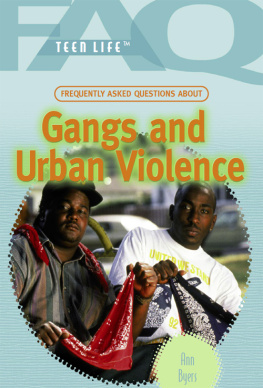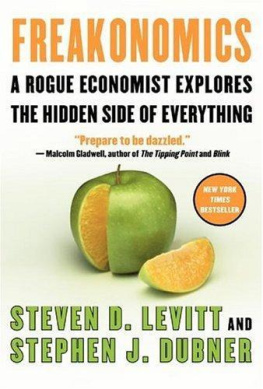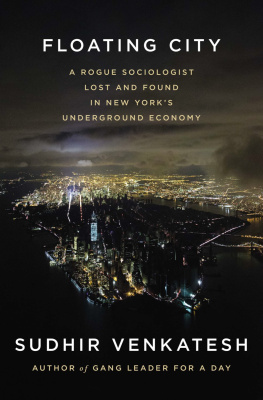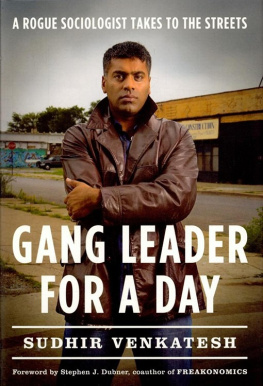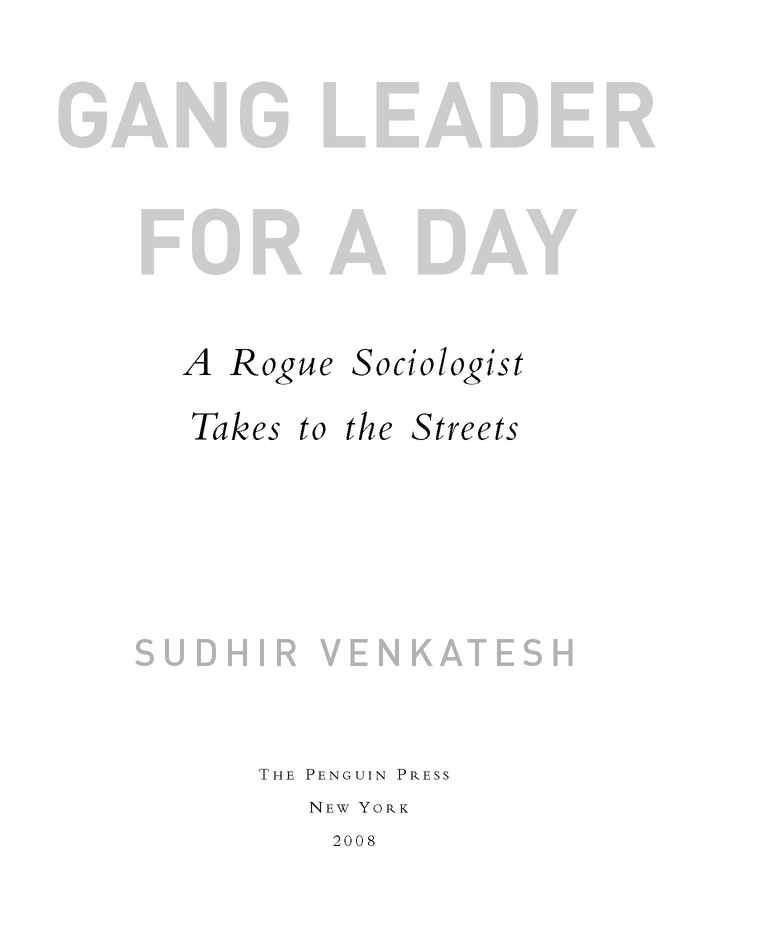Table of Contents
ALSO BY SUDHIR VENKATESH
Off the Books:
The Underground Economy of the Urban Poor
American Project:
The Rise and Fall of a Modern Ghetto
THE PENGUIN PRESS
Published by the Penguin Group
Penguin Group (USA) Inc., 375 Hudson Street, New York, New York 10014, U.S.A. Penguin Group
(Canada), 90 Eglinton Avenue East, Suite 700, Toronto, Ontario, Canada M4P 2Y3 (a division of
Pearson Penguin Canada Inc.) Penguin Books Ltd, 80 Strand, London WC2R 0RL, England
Penguin Ireland, 25 St. Stephens Green, Dublin 2, Ireland (a division of Penguin Books Ltd) Penguin
Books Australia Ltd, 250 Camberwell Road, Camberwell,Victoria 3124,Australia (a division of Pearson
Australia Group Pty Ltd) Penguin Books India Pvt Ltd, 11 Community Centre, Panchsheel Park,
New Delhi-110 017, India Penguin Group (NZ), 67 Apollo Drive, Rosedale, North Shore 0632,
New Zealand (a division of Pearson New Zealand Ltd) Penguin Books (South Africa) (Pty) Ltd,
24 Sturdee Avenue, Rosebank, Johannesburg 2196, South Africa
Penguin Books Ltd, Registered Offices:
80 Strand, London WC2R 0RL, England
First published in 2008 by The Penguin Press,
a member of Penguin Group (USA) Inc.
Copyright Sudhir Venkatesh, 2008
All rights reserved
Library of Congress Cataloging-in-Publication Data
Venkatesh, Sudhir Alladi.
Gang leader for a day : a rogue sociologist takes to the streets / Sudhir Venkatesh.
p. cm.
Includes index.
eISBN : 978-1-4406-3189-4
1. GangsIllinoisChicago. 2. African AmericansIllinoisChicago.
3. Chicago (Ill.)Social conditions. 4.Venkatesh, Sudhir Alladi. I. Title.
HV6439.U7C46 2008
364.10660977311dc22
2007040170
Printed in the United States of America
1 3 5 7 9 10 8 6 4 2
Designed by Claire Vaccaro
Without limiting the rights under copyright reserved above, no part of this publication may be reproduced, stored in or introduced into a retrieval system, or transmitted, in any form or by any means (electronic, mechanical, photocopying, recording, or otherwise), without the prior written permission of both the copyright owner and the above publisher of this book.
The scanning, uploading, and distribution of this book via the Internet or via any other means without the permission of the publisher is illegal and punishable by law. Please purchase only authorized electronic editions and do not participate in or encourage electronic piracy of copyrightable materials. Your support of the authors rights is appreciated.
http://us.penguingroup.com
To Autry Harrison
FOREWORD
Stephen J. Dubner
I believe that Sudhir Venkatesh was born with two abnormalities: an overdeveloped curiosity and an underdeveloped sense of fear.
How else to explain him? Like thousands upon thousands of people, he entered graduate school one fall and was dispatched by his professors to do some research. This research happened to take him to the Robert Taylor Homes in Chicago, one of the worst ghettos in America. But blessed with that outlandish curiosity and unfettered by the sort of commonsensical fear that most of us would experience upon being held hostage by an armed crack gang, as Venkatesh was early on in his research, he kept coming back for more.
I met Venkatesh a few years ago when I interviewed him for Freakonomics, a book I wrote with the economist Steve Levitt. Venkatesh and Levitt had collaborated on several academic papers about the economics of crack cocaine. Those papers were interesting, to be sure, but Venkatesh himself presented a whole new level of fascination. He is soft-spoken and laconic; he doesnt volunteer much information. But every time you ask him a question, it is like tugging a thread on an old tapestry: the whole thing unspools and falls at your feet. Story after story, marked by lapidary detail and hard-won insight: the rogue cop who terrorized the neighborhood, the jerry-built network through which poor families hustled to survive, the time Venkatesh himself became gang leader for a day.
Although we wrote about Venkatesh in Freakonomics (it was many readers favorite part), there wasnt room for any of these stories. Thankfully, he has now written an extraordinary book that details all his adventures and misadventures. The stories he tells are far stranger than fiction, and they are also more forceful, heartbreaking, and hilarious. Along the way he paints a unique portrait of the kind of neighborhood that is badly misrepresented when it is represented at all. Journalists like me might hang out in such neighborhoods for a week or a month or even a year. Most social scientists and dogooders tend to do their work at arms length. But Venkatesh practically lived in this neighborhood for the better part of a decade. He brought the perspective of an outsider and came away with an insiders access. A lot of writing about the poor tends to reduce living, breathing, joking, struggling, sensual, moral human beings to dupes who are shoved about by invisible forces. This book does the opposite. It shows, day by day and dollar by dollar, how the crack dealers, tenant leaders, prostitutes, parents, hustlers, cops, and Venkatesh himself tried to construct a good life out of substandard materials.
As much as I have come to like Venkatesh, and admire him, I probably would not want to be a member of his family: I would worry too much about his fearlessness. I probably wouldnt want to be one of his research subjects either, for his curiosity must be exhausting. But I am very, very happy to have been one of the first readers of Venkateshs book, for it is as extraordinary as he is.
PREFACE
I woke up at about 7:30 A.M. in a crack den, Apartment 1603 in Building Number 2301 of the Robert Taylor Homes. Apartment 1603 was called the Roof, since everyone knew that you could get very, very high there, even higher than if you climbed all the way to the buildings actual rooftop.
As I opened my eyes, I saw two dozen people sprawled about, most of them men, asleep on couches and the floor. No one had lived in the apartment for a while. The walls were peeling, and roaches skittered across the linoleum floor. The activities of the previous nightsmoking crack, drinking, having sex, vomitinghad peaked at about 2:00 A.M. By then the unconscious people outnumbered the conscious onesand among the conscious ones, few still had the cash to buy another hit of crack cocaine. Thats when the Black Kings saw diminishing prospects for sales and closed up shop for the night.
I fell asleep, too, on the floor. I hadnt come for the crack; I was here on a different mission. I was a graduate student at the University of Chicago, and for my research I had taken to hanging out with the Black Kings, the local crack-selling gang.
It was the sun that woke me, shining through the Roofs doorway. (The door itself had disappeared long ago.) I climbed over the other stragglers and walked down to the tenth floor, where the Patton family lived. During the course of my research, I had gotten to know the Pattonsa law-abiding family, it should be saidand they treated me kindly, almost like a son. I said good morning to Mama Patton, who was cooking breakfast for her husband, Pops, a seventy-year-old retired factory worker. I washed my face, grabbed a slice of cornbread, and headed outside into a breezy, brisk March morning.
Just another day in the ghetto.
Just another day as an outsider looking at life from the inside. Thats what this book is about.


